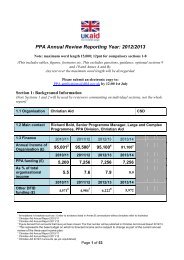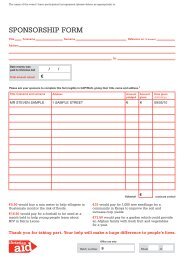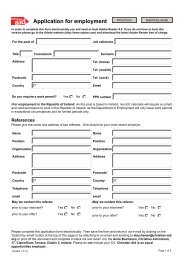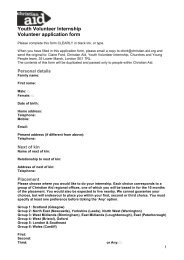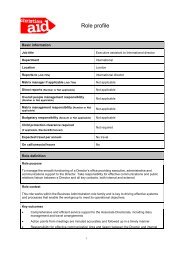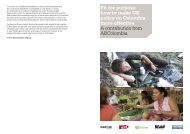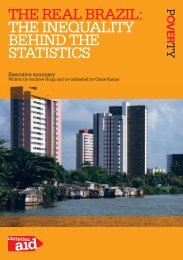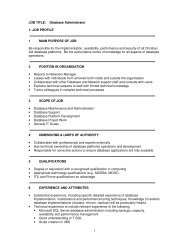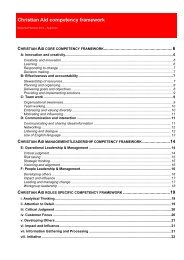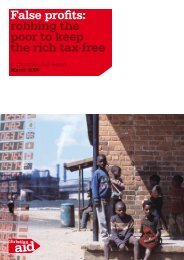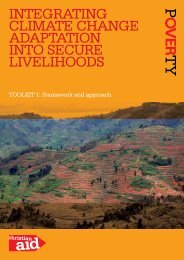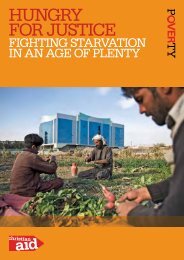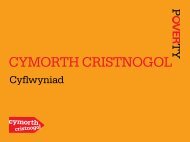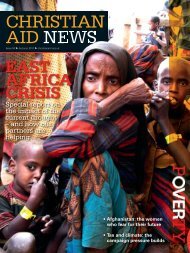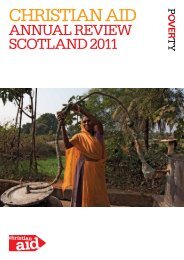CHRISTIAN AID NEWS
CHRISTIAN AID NEWS
CHRISTIAN AID NEWS
Create successful ePaper yourself
Turn your PDF publications into a flip-book with our unique Google optimized e-Paper software.
Building equality: Christian Aid partner<br />
AWEC helped teenage prisoner Nozeni<br />
Izatullah (centre) – convicted of a ‘moral’<br />
crime – learn embroidery and literacy skills<br />
to help her find work upon her release<br />
Christian aid is ambitious and<br />
impatient for change. We know that the<br />
work we’ve been able to do in the past<br />
six decades has improved the lives of<br />
millions, but we also know that to<br />
achieve lasting change on the scale that’s<br />
needed, we must build an even bigger<br />
force for good. to do this we seek to<br />
strengthen our work through<br />
partnership. We know that it is by<br />
working together with others that we can<br />
achieve an end to poverty for the world’s<br />
poorest people.<br />
The time is now<br />
the world in which we operate is<br />
changing dramatically, and on so many<br />
fronts: economic power, available<br />
resources, ideologies, communications<br />
and climate. While some of these things<br />
may be used to help in the battle against<br />
poverty, they can also threaten the ability<br />
of vulnerable communities to claim their<br />
rights and gain equality.<br />
societies today are becoming<br />
increasingly unequal. Power is shifting<br />
to the fast-growing economies of the<br />
global East and south, while<br />
international institutions find themselves<br />
overwhelmed by the task of tackling the<br />
world’s economic problems. supplies of<br />
resources – from copper to water, food<br />
to fossil fuels – are getting tighter, and<br />
those with the greatest power often<br />
exploit it. new conflicts emerge. our<br />
insufficient care for our planet leads to<br />
more frequent natural and man-made<br />
disasters, and increased migration.<br />
and alongside all this, technology is<br />
transforming the way we interact, trade,<br />
create communities and build political<br />
movements. Globalisation certainly<br />
opens up opportunities but it can also<br />
undermine cultural diversity and local<br />
enterprise.<br />
in the face of these threats to the<br />
world’s poor, Christian aid believes it is<br />
essential that individuals and<br />
communities play an even stronger role.<br />
and that they come together to stand<br />
alongside each other – to use their<br />
influence to protect the rights of all and<br />
ensure the dignity of every person.<br />
Partnership with whom?<br />
Who are the partners with whom we<br />
seek to work? they are many and varied:<br />
the churches and other nGos, certainly,<br />
but also government and businesses.<br />
and we seek to build partnerships with<br />
individual supporters – all of you who so<br />
tirelessly organise and influence your<br />
communities: raising and giving money,<br />
praying, campaigning and building<br />
political pressure for change. Each of us<br />
lives within a network of relationships,<br />
which give us opportunities to influence<br />
others: within our communities and our<br />
churches, in our business dealings and<br />
with our shopping choices and our<br />
political actions – to name just a few.<br />
and each and every one of us can<br />
influence these relationships for good.<br />
in our churches and communities, we<br />
can raise awareness, give, act and pray<br />
in support of Christian aid. as voters and<br />
lobbyists, we can use our power to rouse<br />
the conscience of politicians by<br />
campaigning on issues such as tax<br />
justice and climate change. and as<br />
consumers and campaigners we can<br />
change the policies of business, large<br />
and small, through initiatives such as the<br />
trace the tax campaign.<br />
Christian aid is committed to growing<br />
and deepening relationships between<br />
individuals, communities and countries;<br />
between civil society, business,<br />
government, charities and churches;<br />
between people of all faiths and of none,<br />
in order to evolve and strengthen a vast,<br />
necessary and unequivocal movement<br />
for change. this is what we call our<br />
Partnership for Change.<br />
To seek what?<br />
Christian aid’s analysis of poverty is that<br />
at its root is a lack of power: the power,<br />
for example, to have your say and be<br />
heard, to know your rights and demand<br />
them, to have access to essential<br />
services, to share fairly in the world’s<br />
resources and to have the security of not<br />
just surviving, but also of thriving.<br />
rooted in our belief in a creative and<br />
loving God, Christian aid is clear that<br />
poverty can be eradicated through<br />
supporting and empowering individuals<br />
and communities to change their lives.<br />
We believe we can achieve this ambition<br />
by focusing our skills and experience<br />
where they can make the greatest<br />
impact.<br />
• The five examples outlined on the<br />
following page highlight those areas on<br />
which we will focus. Bless you and thank<br />
you for all that you do to partner with us<br />
to turn our new strategy into real and<br />
lasting change.<br />
Christian Aid News 19



